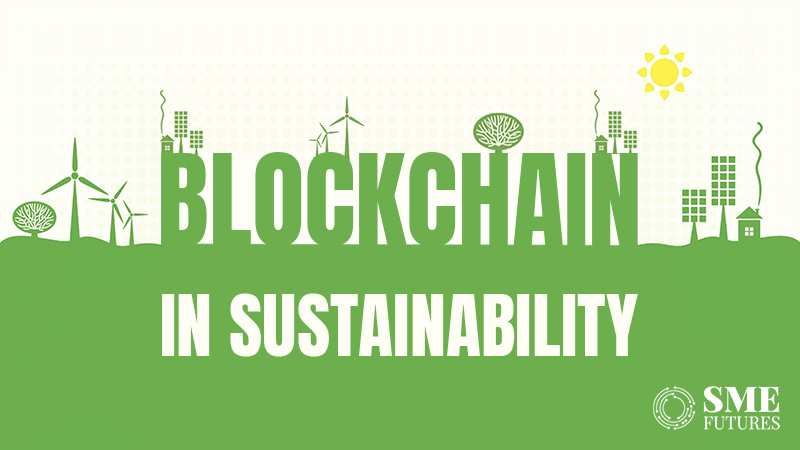Blockchain technology has emerged as a powerful tool that has the potential to revolutionise various industries, including sustainability. By leveraging blockchain, businesses can promote transparency, accountability and ethical practices in their operations, thereby contributing to a more sustainable future. Through the implementation of blockchain-based solutions, companies can address key challenges such as supply chain traceability, carbon footprint tracking, smart contracts, energy consumption, circular economy, ESG reporting, fundraising for sustainability projects, and the tokenisation of natural assets. These applications empower businesses to make informed decisions, build trust with consumers and stakeholders, reduce costs, and drive positive environmental and social impact.
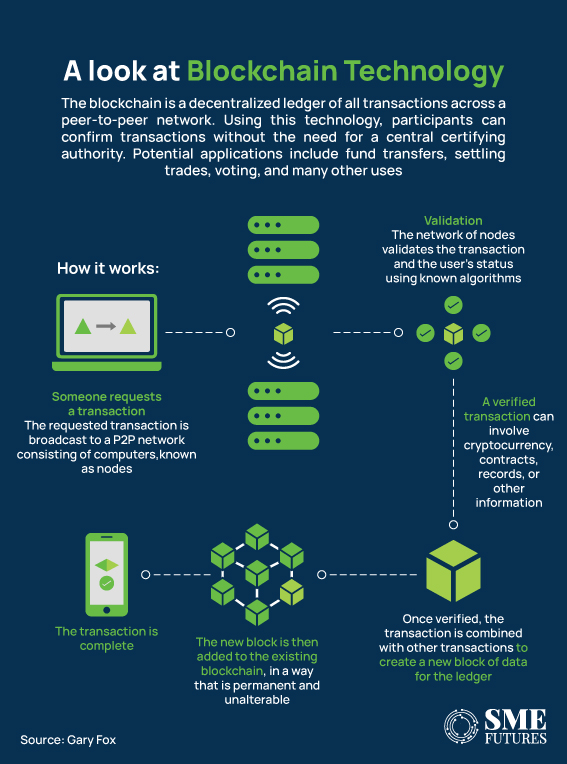
“India has more than 60 million MSMEs. MSMEs work with limited resources and collaborations with their partners, peers, customers, and government agencies would help them to grow in a sustainable manner. Two key attributes of blockchain technology are decentralisation and transparency, which can help MSMEs to collaborate with peers, customers, and government agencies,” says Vitthal Naik, Chief Technology Officer, Profectus Capital.
Promoting transparency and accountability
“Blockchain technology works by creating a distributed ledger that records transactions and information in a transparent and tamper-proof manner. Each block in the chain contains a unique hash that links it to the previous block, creating an unbroken chain of information. This makes it virtually impossible to alter or manipulate the data on the blockchain,” says Abhishek Agarwal, President, Judge India – Global Delivery, The Judge Group.
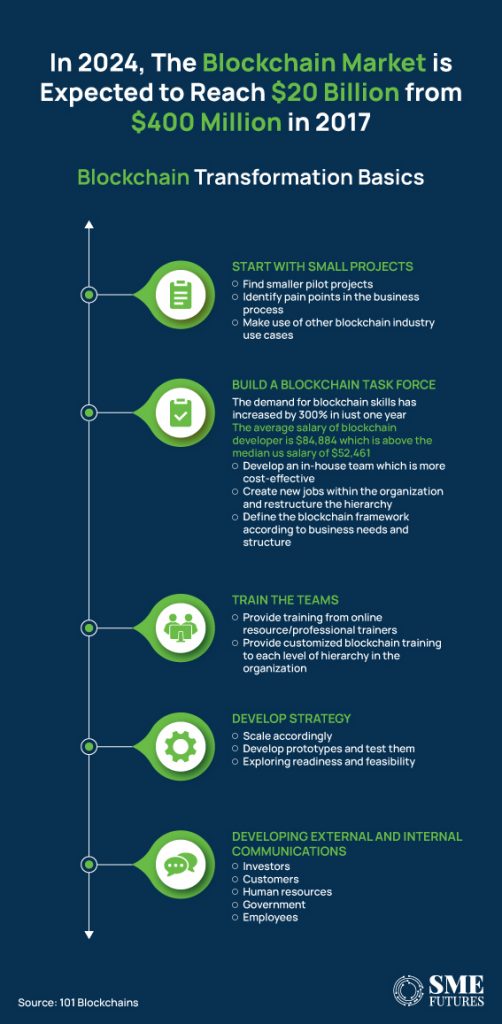
Abhishekh Deshpande, Head of Marketing at CentraHub elaborates on how blockchain can be used to promote transparency and accountability and why organisations, which have loads of data to go through, can opt for it. He lists out the key areas in which it could be beneficial, which are:
Supply Chain Traceability: Blockchain technology enables the tracking of products from their origin to the end consumer, ensuring that raw materials are sustainably sourced. This transparency promotes ethical practices and discourages the use of materials obtained through environmentally harmful methods or unethical labour practices.
Carbon Footprint Tracking: Blockchain facilitates the validation and recording of a company’s carbon emissions data, enhancing transparency and enabling the implementation of carbon offset programmes. This approach empowers businesses to measure and mitigate their environmental impact effectively.
Smart Contracts: Blockchain-enabled smart contracts enforce sustainable practices among suppliers by releasing payments only upon the verification of certain sustainability criteria. These contracts automate compliance checks and ensure that sustainability goals are met throughout the supply chain.
Energy Consumption: Blockchain technology supports decentralised energy production and trading, promoting the use of renewable energy sources. By enabling peer-to-peer energy trading and the creation of local energy grids, blockchain contributes towards a more sustainable energy sector.
Circular Economy: Blockchain can facilitate the tracking and validation of a product’s lifecycle, encouraging recycling and waste reduction. By incentivising proper disposal, recycling, and reuse, blockchain supports the transition to a circular economy.
ESG Reporting: Blockchain provides a transparent and tamper-proof platform for companies to report on their Environmental, Social, and Governance (ESG) practices. This ensures the integrity of the reported data and enables stakeholders to assess a company’s sustainability performance accurately.
Fundraising for Sustainability Projects: How-Blockchain-Can-Play-Crucial-Role-in-Sustainable-Business-Practices Blockchain-based tokens or coins can be used to raise funds for sustainable business projects. The use of these funds is tracked and reported on the blockchain, promoting transparency and accountability in resource allocation.
Tokenisation of Natural Assets: Blockchain enables the tokenisation of natural assets like forests or clean water sources, incentivising their protection and sustainable management. This approach ensures the preservation of valuable resources and encourages responsible stewardship.
Verifying and tracking environmental impact data
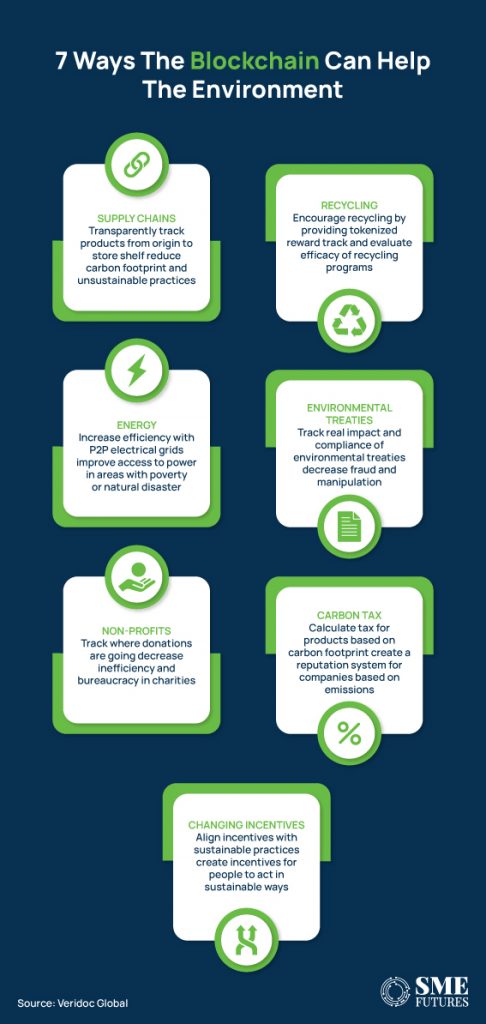
Blockchain plays a crucial role in verifying and tracking environmental impact data for businesses striving to improve their sustainability performance in the following ways:
Carbon Emissions: Companies can record and verify their greenhouse gas emissions on the blockchain, promoting transparency and enabling effective emission reduction strategies.
Resource Consumption: Blockchain tracks the usage of water, energy, and other resources across a company’s operations, identifying inefficiencies and areas for improvement in their sustainable practices.
Sustainable Energy: Blockchain records the generation and consumption of renewable energy, facilitating the creation and transparent trading of energy credits.
Carbon Credit Trading: Blockchain enables the trading of carbon credits, ensuring transparency and reliability in the transaction process. This encourages companies to reduce their carbon emissions and invest in sustainability.
“These blockchain applications provide businesses with accurate and transparent environmental impact data, enabling them to make informed decisions and drive continuous improvement in their sustainability practices,” Agarwal points out.
Facilitating implementation and enforcement of sustainable practices
“Smart contracts can be designed to release payments or execute transactions only when certain sustainability criteria are met. This can be used to enforce compliance with environmental standards among suppliers and partners,” Deshpande tells us.
Smart contacts are beneficial from a number of aspects which include accountability and transparency, efficient auditing, and incentives for adopting sustainable practices.
“These features of blockchain-based smart contracts enhance sustainability efforts by automating compliance, reducing administrative burdens, and promoting responsible behaviour throughout the supply chain,” he further adds.
Overcoming challenges and barriers
“The lack of knowledge and understanding of a blockchain system, is a major challenge. Currently, there is no method of deleting a digital path or destroying any privacy safeguards in a blockchain. Usually, you do not wish to do so; however, this can lead to a substantial increase in the requirement for storage space,” says Sagar Chandola, an AI expert working with a healthcare institution.
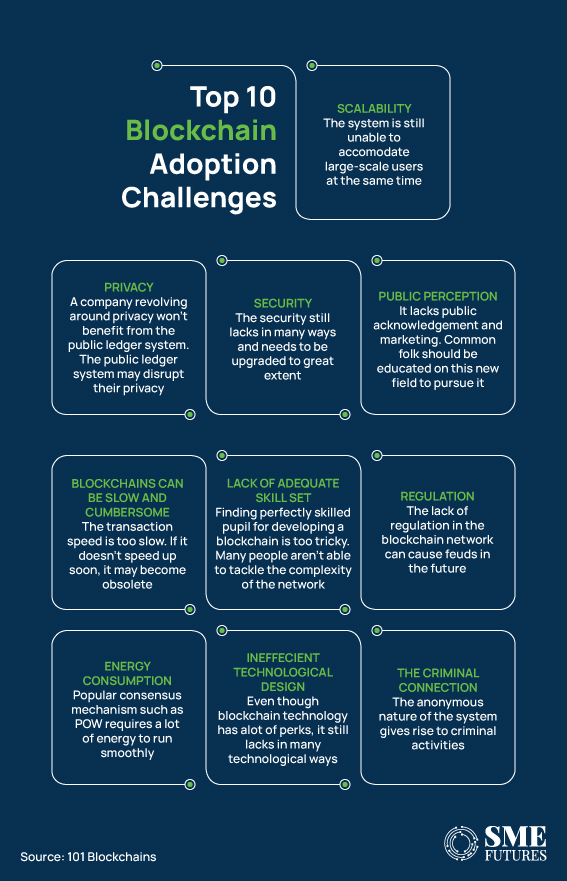
While blockchain offers tremendous potential for supporting sustainable practices, businesses may face several challenges during its adoption, which are as follows:
Technical Complexity: Implementing blockchain requires technical expertise, which can be addressed by hiring skilled personnel or by partnering with blockchain service providers.
High Energy Consumption: Traditional blockchain networks can be energy intensive. Switching to less energy-consuming consensus mechanisms and optimising energy usage can mitigate this challenge.
Interoperability: Different blockchain platforms may not seamlessly interact with each other, requiring standardisation and the use of interoperable protocols in supply chain contexts.
Regulatory Uncertainty: The regulatory landscape for blockchain is evolving, necessitating engagement with legal experts and policymakers to navigate potential legal uncertainties.
“Data privacy is a major concern when it comes to creating a scalable and sustainable ICT infrastructure. Some solutions have ‘forks’ in between, which act as a buffer rule to tweak the blockchain if there is a pressing need,” Chandola adds.
Empowering sustainable energy sector
Blockchain technology has great potential in the sustainable energy sector and can enable it to become a more efficient and eco-friendly industry. One area where it excels in is peer-to-peer (P2P) energy trading by creating decentralised markets for direct energy exchange between producers and consumers. This empowers individuals, reduces costs, and promotes renewable energy adoption.
Blockchain’s application extends to microgrids, supporting local energy grids in more efficient household energy generation and consumption. The excess energy can be sold to neighbours, fostering sustainability and reducing the reliance on fossil fuels.
Moreover, blockchain ensures the transparent tracking of renewable energy certificates, bolstering investment and allowing consumers to choose green energy options confidently.
Grid management benefits from the real-time data recording on the blockchain, optimising performance and balancing supply and demand for a more stable infrastructure.
Incentivisation is facilitated by blockchain-based tokens or coins, encouraging sustainable energy practices and the transition to renewables.
“Leveraging blockchain technology, the energy sector can embrace decentralisation, promote renewable energy adoption, and foster a more sustainable future. Its potential for efficiency, transparency, and environmental stewardship is immense,” Naik asserts.
Fostering trust and combating greenwashing
Blockchain technology plays a crucial role in addressing the problem of greenwashing and ensuring the credibility of the sustainable claims made by businesses.
One of its key advantages is its ability to provide transparency and verifiability. By utilising an immutable and decentralised ledger, blockchain records and verifies a company’s sustainable practices, eliminating the possibility of manipulating or falsifying sustainability claims.
Another benefit is product traceability, wherein blockchain enables the tracking of products, allowing consumers to verify if they have been sustainably sourced or produced.
“Blockchain facilitates auditable Environmental, Social, and Governance (ESG) reporting, which is tamper-proof and can be verified by stakeholders. By promoting transparency, accountability, and verifiability, blockchain empowers consumers and stakeholders, fostering trust and discouraging greenwashing in businesses,” says Deshpande.
Cost savings and efficiency gains
Integrating blockchain technology into sustainable practices brings about notable cost savings and efficiency gains for businesses.
One major advantage is that it streamlines the efficiency of the supply chain. By providing real-time, transparent tracking of goods, blockchain reduces losses, fraud, and the administrative costs associated with supply chain operations.
Moreover, the transparency offered by blockchain simplifies the auditing process for sustainability compliance, resulting in significant cost reductions in audit expenses. Additionally, blockchain-based smart contracts automate compliance checks and payments, reducing administrative costs and minimising human errors. The utilisation of blockchain for peer-to-peer energy trading and smart grid integration also contributes to energy efficiency, lowering energy costs and minimising waste. Furthermore, blockchain eliminates intermediaries, thereby reducing the transaction costs related to procurement and payments.
Lastly, blockchain brings transparency in suppliers’ practices, enabling businesses to mitigate the risks associated with non-compliance to sustainability standards. By harnessing the power of blockchain, businesses can achieve cost savings, streamline their operations, and enhance their overall sustainability performance.
Conclusion
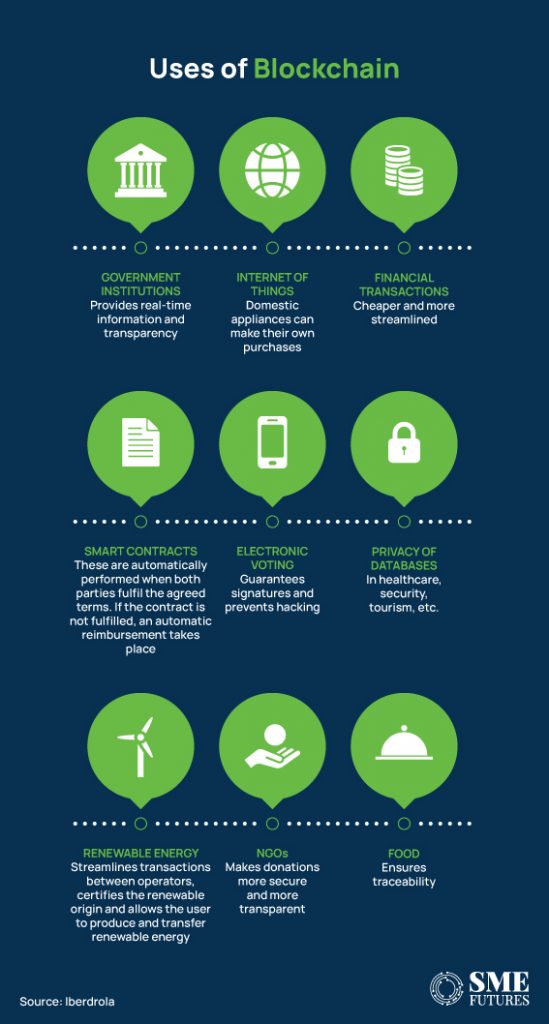
Blockchain technology has the potential to revolutionise sustainable business practices across various industries. Through enhanced supply chain traceability, carbon footprint tracking, smart contracts, energy consumption management, circular economy support, ESG reporting, fundraising for sustainability projects, tokenisation of natural assets, and more, blockchain promotes transparency, accountability, and efficiency in sustainable practices.
Although its adoption raises several challenges like technical complexity, energy consumption, interoperability problems, regulatory uncertainty, and data privacy, businesses can overcome them by investing in expertise, collaborations, standardisation, and by engaging with the relevant stakeholders. By adopting blockchain and leveraging its capabilities, businesses can achieve cost savings, mitigate risks, foster trust, combat greenwashing, empower the sustainable energy sector, and incentivise sustainable behaviours. Hence, it is all too apparent that by utilizing blockchain as a powerful tool, sustainable business practices can become a reality, paving the way for a greener and more sustainable future for us all.

